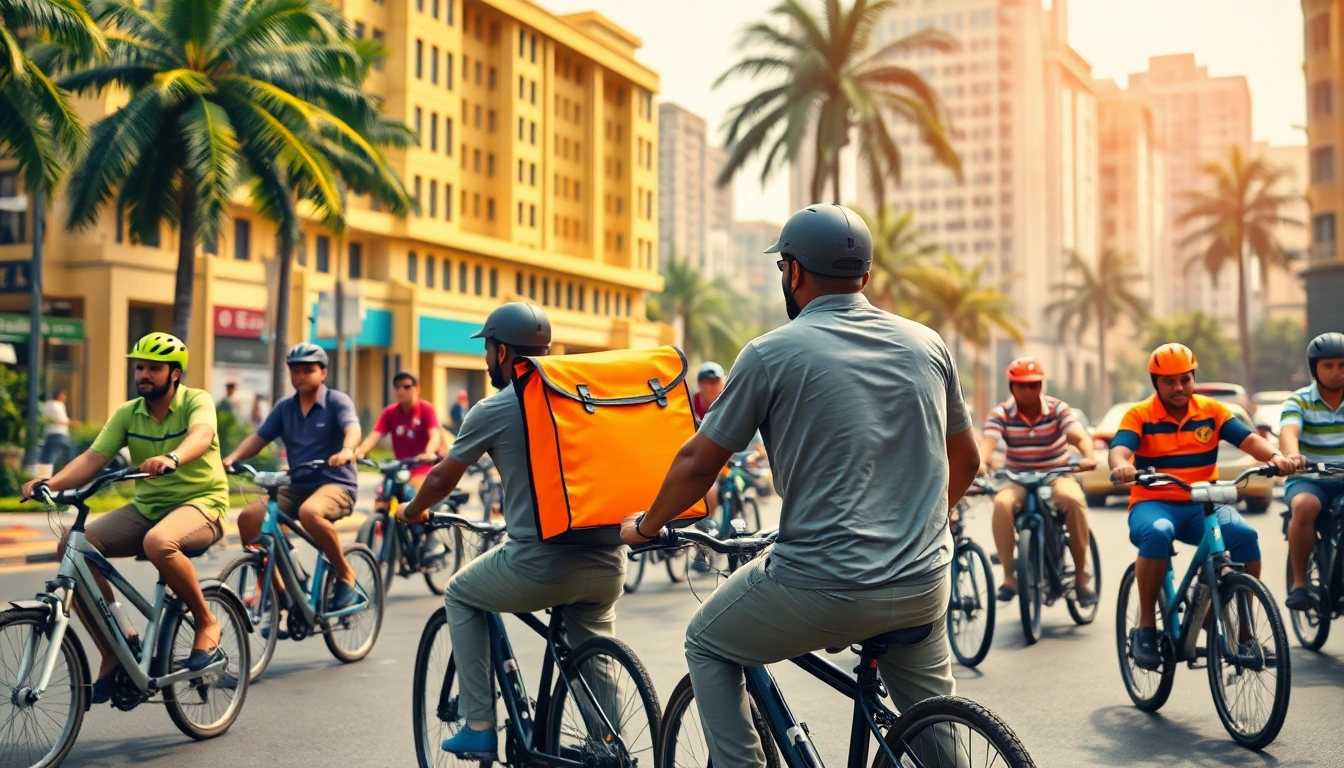The bustling metropolis of Lagos is known for its vibrant culture, diverse population, and relentless pace of life. As the largest city in Nigeria and one of the fastest-growing urban centers in the world, Lagos has seen a significant shift in consumer behavior, particularly in recent years. The demand for delivery apps in Lagos has skyrocketed, reshaping how residents shop, dine, and access services. This article delves into the emergence of delivery apps, how they operate, the benefits they provide, the challenges they face, and what the future holds for this rapidly evolving industry.
1. Overview of Delivery Apps in Lagos
a. The Rise in Demand for Delivery Services
In recent years, there has been an unprecedented increase in the demand for delivery services across Lagos. This trend was initially driven by urbanization and economic growth, which have led to busier lifestyles. Residents seeking convenience have turned to delivery apps for their groceries, meals, and other essentials. The COVID-19 pandemic only accelerated this shift. With social distancing measures and lockdowns in place, many consumers turned to these apps as a safe alternative to in-person shopping.
b. Key Players in the Lagos Market
The Lagos delivery service landscape is populated by several key players, each competing to capture market share in this lucrative space. Major players include Jumia Food, Bolt Food, and Glovo, alongside local startups like Travo and others that focus specifically on running errands and deliveries within vast neighborhoods. These companies have established user-friendly interfaces and loyalty programs that entice users to keep coming back. Each of these platforms offers distinct features that cater to different segments of the population, from affluent consumers seeking gourmet food to everyday shoppers needing basic groceries.
c. Consumer Preferences and Trends
Understanding consumer preferences is critical for businesses in the delivery app space. Research shows that Lagosians prioritize factors such as speed, reliability, and cost. Users often favor platforms that provide real-time tracking and offer competitive pricing. Additionally, there’s a notable trend towards supporting local businesses, with many consumers choosing apps that feature neighborhood restaurants and markets, thus contributing to the local economy. Sustainability is also gaining traction, with increasing consumer awareness towards environmentally friendly practices influencing their choices.
2. How Delivery Apps Work
a. The User Experience: Placing Orders
The user experience is a fundamental aspect of any delivery app. When users open an app, they are greeted with an intuitive interface featuring categories such as restaurants, groceries, and other local services. Users can browse menus, customize their orders, and proceed to checkout with a few taps. Payment options tend to be flexible, accommodating mobile wallets, credit cards, and cash on delivery—catering to the diverse financial preferences in Lagos.
b. Logistics Behind the Delivery Process
The success of delivery apps hinges on efficient logistics. Each app relies on a network of local delivery personnel, often referred to as ‘riders,’ who are responsible for transporting orders from vendors to customers. Effective logistics management is key to maintaining timely deliveries, especially in a congested city like Lagos. Companies employ advanced algorithms to optimize routes, reduce delivery times, and improve overall efficiency. Partnerships with local restaurants and vendors also enhance the quality and availability of delivery options for users.
c. Tracking Your Order in Real-Time
Real-time tracking has become a standard feature in delivery apps, allowing customers to monitor their orders from preparation to delivery. This transparency builds trust and has a direct impact on customer satisfaction. Users can see their rider’s location and estimated delivery time, which helps manage their expectations. Notifications and updates are crucial aspects of this feature, ensuring users feel informed throughout the process.
3. Benefits of Using Delivery Apps in Lagos
a. Convenience and Speed
One of the primary advantages of using delivery apps is convenience. With just a smartphone, users can access a plethora of services without stepping outside their homes or offices. The speed of service is also noteworthy; many apps guarantee delivery within an hour, allowing users to receive food, groceries, or even medicine almost instantly. This on-demand nature caters to the fast-paced lifestyle of many Lagosians, making delivery apps essential in modern living.
b. Expanding Access to Local Businesses
Delivery apps play a pivotal role in bridging the gap between local businesses and consumers. Small restaurants and merchants, who may not have the resources to maintain a standalone delivery service, can leverage these platforms to reach a broader audience. This not only helps local entrepreneurs survive in a competitive market but also fosters a diverse marketplace where consumers can experiment with various cuisines and products.
c. Promotions and Discounts for Users
Competitive pricing strategies are a critical element of delivery apps, making them attractive to users. Many platforms regularly offer promotions, discount codes, and loyalty rewards to incentivize frequent usage. Users can benefit from first-time order discounts or loyalty points redeemable for future deliveries. These financial incentives not only increase user engagement but also enhance customer retention rates.
4. Challenges Faced by Delivery Apps in Lagos
a. Traffic and Urban Infrastructure Issues
The urban infrastructure in Lagos poses significant challenges for delivery services. Traffic congestion is a notorious problem, leading to delays and frustrations for both riders and customers. The city’s roads can be unpredictable, which complicates the planning of delivery routes. Delivery companies must innovate continually, employing real-time traffic data and route optimization tactics to counter these issues.
b. Competition and Market Saturation
The rapid growth of delivery services has led to a saturated market, with numerous players vying for attention. This fierce competition pushes companies to differentiate their services, which can lead to aggressive marketing strategies and price-cutting. However, while competition has its benefits, it also risks compromising quality and service levels as companies scramble to capture market share. Strategic partnerships and unique value propositions are essential for standing out amidst the noise.
c. Ensuring Safety for Riders and Customers
Safety is a paramount concern for both delivery personnel and consumers. Riders face risks associated with road accidents, while customers must trust that their food and goods are delivered safely. Delivery companies need to implement stringent safety protocols, including rider training, valid identification, and insurance. Additionally, utilizing technology to monitor rider behavior and customer feedback can help identify and mitigate potential safety risks.
5. Future of Delivery Apps in Lagos
a. Technological Innovations on the Horizon
The future of delivery apps is inextricably linked to technological advancements. Innovations such as artificial intelligence, machine learning, and blockchain are expected to revolutionize logistics and customer interaction. AI can optimize delivery routes more effectively, while machine learning can personalize user experiences based on preferences and past behaviors. Furthermore, implementing blockchain technology may enhance transparency and trustworthiness in transactions.
b. Adaptations to Consumer Behavior Post-Pandemic
The lessons learned during the pandemic have prompted lasting changes in consumer behavior. Many have become accustomed to online shopping and home delivery services, creating sustained demand for these apps. As businesses adapt to these shifts, delivery companies will need to remain flexible, offering more diverse products and services that cater to the evolving needs of their clientele. This may also include a stronger emphasis on health and safety practices, such as contactless delivery options.
c. Sustainable Practices in Delivery Services
As the world leans towards sustainability, delivery apps in Lagos must also consider their environmental impact. Many companies are now exploring eco-friendly delivery options, such as using bicycles or electric vehicles to reduce carbon emissions. Additionally, encouraging customers to consolidate orders can minimize the frequency of deliveries, further contributing to sustainability efforts. Adopting green practices will not only satisfy environmentally conscious consumers but can also enhance brand reputation and loyalty.





